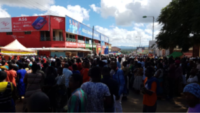Malawi National Students Union
Covid-19: Global Pandemic Yet One Size Fits All Impractical
In March 2020 the World Health Organization (WHO) declared the outbreak of a novel coronavirus disease, COVID-19, to be a pandemic, due to the speed and scale of transmission. COVID-19 represents an unprecedented global emergency with numbers of cases continuing to soar, schools closing, and health services preoccupied with handling COVID-19 cases. Though the elderly and those with pre-existing conditions are most vulnerable, adolescents and youth are also at risk of contracting and transmitting the coronavirus. Additionally, the closure of schools continues to impact education of adolescents and youth and fracture social networks.
Disruptions to formal and informal work are creating new pressures on livelihoods including amongst youth. Such public health crises will also exacerbate existing vulnerabilities, access to care services, and inequalities, particularly for women and girls.
As of 11th April 2020, Malawi had registered 11 cases of covid-19 with 2 death cases. As the practice across the globe, the government of Malawi intensified its efforts to contain the spread of the pandemic. On Tuesday, the 14th of April, the government of Malawi declared a21 days lockdown from 18th April to 9th May, 2020. Whilst this move was meant to contain the spread chances are high it posed the danger to further its spread as people took it to the streets to protest against the lockdown. People protested against the decision as no safety nets were provided.
Most workers who live hand to mouth and form the majority of the employment sector in the urban areas were not in favour of this decision as it posed a threat to their survival. Demonstrations were conducted in all the four regions of Malawi. In the Central Region, Protests were conducted in Lilongwe, in the North in Mzuzu, in the South in Blantyre and in the Eastern in Mangochi. Vendors took and other citizens took it to the streets.
Whilst the lockdown remains a good strategy to contain the spread of the global pandemic, the policy was wrongly declared due to lack of contextualisation and localisation in the context of Malawi. Close to 60% of Malawians living in the urban areas live hand to mouth and 21day lockdown with no safety nets is a non-starter. Whilst Malawi is borrowing a leaf from other countries which have been heavily affected, there was need to implement the strategies with consideration of local environment such as the need for safety nets. In as much as there is need to borrow leaf in the fight against the global pandemic, there is need to contextualise the solutions. The one size fits all approach to fight the global pandemic will not work. African countries need to find local working solutions in addition to what developed countries are implementing.









